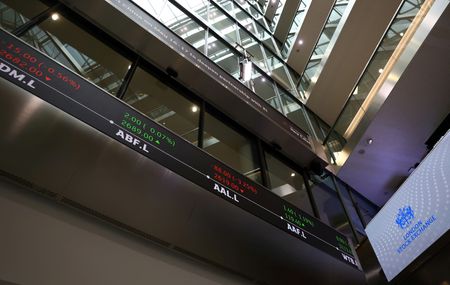By Joanna Plucinska and Paolo Laudani
(Reuters) -Europe’s largest travel operator TUI reported a jump in first-quarter profit and maintained its profit outlook for the coming year on Tuesday, but saw its shares sink more than 9% as bookings growth weakened.
While European airlines faced struggles last year, travel companies such as TUI benefited from a resurgence of packaged holidays. However, TUI said bookings for the upcoming summer were up only 2%, with one third of packages booked.
“The first quarter was good, but the bookings development should counteract that,” a trader told Reuters.
Bookings growth slowed as TUI eased off on expanding capacity and on pricing, Group CEO Sebastian Ebel said. Demand was also shifting to new destinations and away from previously strong markets like Turkey.
There was a slight dip in bookings after Christmas, Ebel said on a media call, likely tied to adverse weather in Britain and less consumer spending power after the holidays.
That trend is set to recover, the company said.
Holidaymakers are increasingly turning to all-inclusive package holidays due to soaring hotel and flight prices.
Shares of TUI sank 9.25% in morning trading after announcing its first quarter results.
OUTLOOK
TUI confirmed its annual outlook and reported first-quarter underlying earnings before interest and taxes (EBIT) of 51 million euros ($52.55 million), up significantly from 6 million euros a year earlier as it began recovering from the pandemic.
At the end of last year, the company forecast 2025 EBIT growth to ease to 7% to 10% due to one-off costs, significantly slower than TUI’s expected EBIT growth of 25% for 2024.
High expenses, amid investments in marketing and IT to expand some European operations, and a renewed interest in dynamic packages and flexible pricing, will likely also hamper growth this year.
Its outlook could also be impacted by a later date for Easter this year, with a 30 million euro ($30.90 million) drop in revenues set for the second quarter, as a bookings spike tied to the holiday spills into the third quarter instead.
While travel demand has remained robust, TUI, like other European airline businesses, has been affected by Boeing delivery delays and high costs. Ebel said he hoped the Boeing 737 MAX delivery delays would be resolved by 2027.
CHALLENGES
The first quarter is usually the weakest for airlines, as travellers are less likely to fly between January and March. For TUI, the first quarter runs from October to December. The company said it expected a strong second-half of the year.
“People prioritise their holidays even in times of change, and even in a challenging economic environment in Europe for almost all sectors,” Ebel said.
TUI reported a decline in performance in the Markets and Airlines segment, which saw a 31% drop in underlying EBIT year-on-year due to seasonal investments ahead of the summer travel period.
However, its Holiday Experiences segment saw an improvement, rising to 150.3 million euros ($154.81 million) in the reported quarter from 90.7 million euros ($93.42 million) last year.
($1 = 0.9706 euros)
(Reporting by Joanna Plucinska and Paolo Laudani; Additional reporting by Ilona Wissenbach; Editing by Milla Nissi, Sherry Jacob-Phillips and Bernadette Baum)










